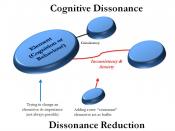The Oxford Dictionary of Psychology defines attitude as 'an enduring pattern of evaluative responses towards a person, object or issue.' The functions of people's attitudes, how they relate to their behaviour, and how to change people's attitudes have always been of interest to Social Psychologists. As a result of this interest, much work has been conducted, and theories have been created about the subject. This essay will examine how Social Psychologists have theorised the relationship between attitudes and behaviour, evaluating how successful they have been. This essay will focus specifically on evaluating the theories of cognitive dissonance (Festinger 1957), planned behaviour (Ajzen 1991) and the tripartite model of attitude (Rosenberg and Hovland 1960).
It seems common sense to think that someone's attitude to something would influence their behaviour. For example, someone who did not like the idea of people killing animals for food would not advocate the eating of meat, and be vegetarian.
In a similar way, someone who was interested in being healthy would not smoke. However, this does not always seem to be the case. This seemingly strange attitude-behaviour relationship interested Festinger in 1957. Festinger theorised that this relationship between one's attitude and contradictory behaviour should be known as 'Cognitive Dissonance'. When an individual holds two thoughts or cognitions that are polar opposites, this causes 'psychological discomfort or tension'. We aim to reduce this by giving less importance to one cognition. This is a way to rationalise our behaviour. One way of reducing dissonance is either to stop smoking, or in the case of the omnivorous individual, to stop eating meat. However, weaknesses such as 'I enjoy smoking/ eating meat' lead the person to lower the importance of the evidence to stop the behaviour to reduce dissonance. Smokers, for example, might give a higher importance to...


